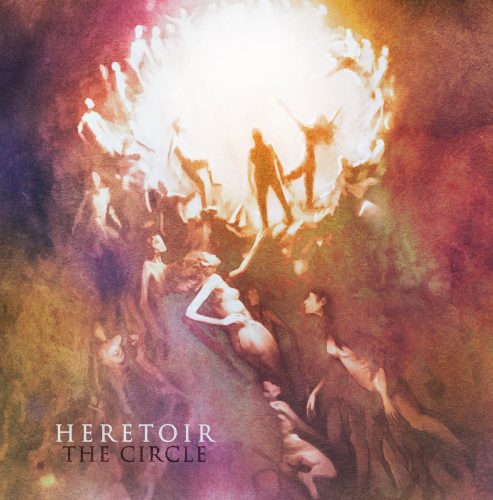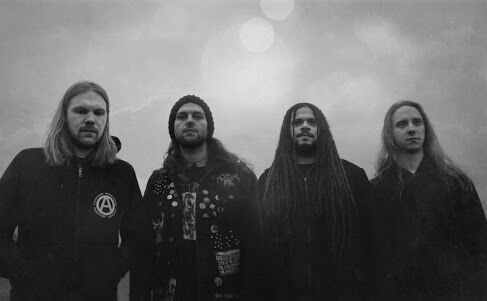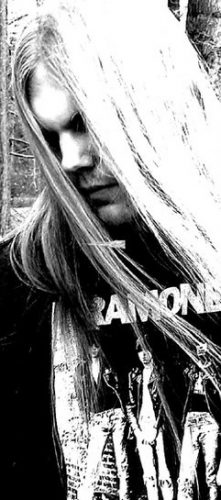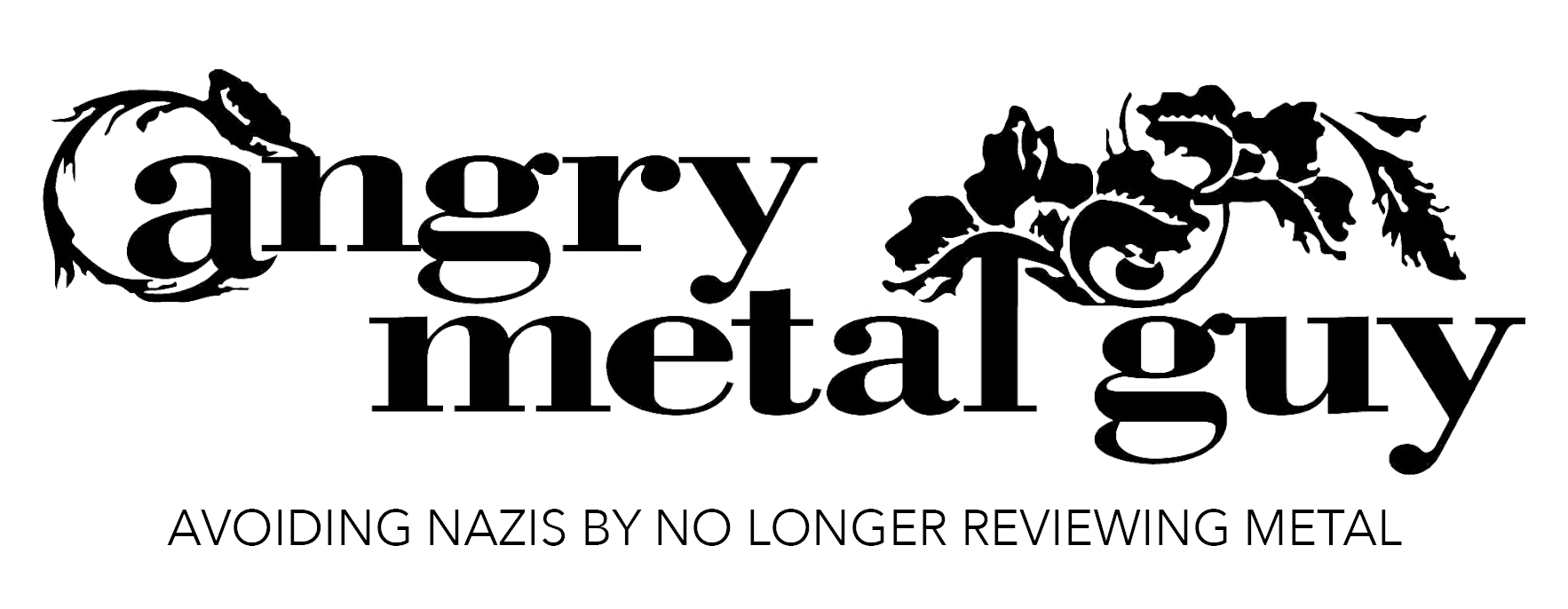 Nobody likes being depressed, plain and simple. It inherently brings us somewhere cold, dark and painful, and conversations centered around the subject can often lead to similarly unpleasant destinations. As important and necessary as communication is, whether we’re struggling with mental distress or walkin’ on friggin’ sunshine, depression and anxiety are often able to plant themselves directly between the affected individual and their ability to effectively convey their struggles—and that sucks, yo. A second or two of sympathetic listening, or a simple expression of understanding or acknowledgment can make all the difference in the world, but talking about these things can be difficult for many people. Luckily, I’m not people, and I jumped at the chance to discuss all of this and more when our own lovable man-cat/angry metal saint Grymm first posited the idea for just such a piece. Shortly thereafter, I
Nobody likes being depressed, plain and simple. It inherently brings us somewhere cold, dark and painful, and conversations centered around the subject can often lead to similarly unpleasant destinations. As important and necessary as communication is, whether we’re struggling with mental distress or walkin’ on friggin’ sunshine, depression and anxiety are often able to plant themselves directly between the affected individual and their ability to effectively convey their struggles—and that sucks, yo. A second or two of sympathetic listening, or a simple expression of understanding or acknowledgment can make all the difference in the world, but talking about these things can be difficult for many people. Luckily, I’m not people, and I jumped at the chance to discuss all of this and more when our own lovable man-cat/angry metal saint Grymm first posited the idea for just such a piece. Shortly thereafter, I tricked reached out to several artists to see if they might be interested in joining the conversation; the responses back were immediate, enthusiastic and overwhelmingly supportive,1 and I’m truly honored to have participated in the conversations that followed. That the artists involved would have so much as the time of day for this dumpster fire website was amazing in and of itself, but the insight and unified narrative that Grymm‘s dark brainchild has fostered have proven to be downright inspiring.
Today’s interview took place between myself and Nils Groth, the drummer for Heretoir and former vocalist of King Apathy. Given the melancholic introspection and social commentary of the bands’ respective lyrics, I sought to examine the space between the two perspectives; we discussed the importance of looking into/ out for each other, remembering that the big world and the little people in it are one and the same. Nils opened up a little about some of his own encounters with depression, as well as offered advice and encouragement for those dealing with similar issues. The unforgiving bastardry of reality coupled with the fevered pipe dream of a functional publishing schedule caused this candid conversation to be cut short,2 yet I took something HUGE away from the experience nonetheless, and I’m hoping that some of you will do the same.
I don’t know Nils, nor had I ever had any contact with him prior to this interview; for all intents and purposes, I basically showed up outta nowhere and started grilling this stranger via email all about his thoughts and experiences regarding depression—and he opened right the fuck up. That someone would so readily and openly discuss topics such as being depressed or seeing a psychiatrist was somewhat surprising as it was, but when I think of how daunting such conversations can seem versus how comfortable and natural this one felt, it blows my mind and reminds me that we’re all in this together. By and large, people don’t wish to see others suffer any more than they wish to suffer themselves, and if you take the often seemingly terrifying step of putting yourself out there, you might be amazed by just how ready the world actually is to catch you when you’re falling.

My point: If you need a hand, reach for one. If you need a shoulder to cry into, lean into one. If you need a set of ears to vent to, start screaming; if you can’t get through something alone, then fucking don’t, yo. Sure, people suck and a lot of them may still fail at saving the day, but no one is going to randomly put out a fire that they can’t see. Always remember that there are people all over the world who understand and care about you and what you’re going through, whoever you are and whatever that may be, and never be afraid to reach out to them by any means necessary.
Muppet: Before I get all inquisitive and whatnot, I just want to say thanks for joining us with this. Your work in King Apathy spoke volumes to me, and Heretoir remains one of my go-to bands for when I need to center myself, so to speak, and it means a lot to me that you would take the time to speak on a topic that not many people care to honestly discuss, so thank you for talking with me, very very much.
For starters, let’s talk about talking about depression. It can be very difficult to open up and establish any helpful lines of communication when you’re dealing with depression, anxiety, thoughts of suicide, etc. It’s not difficult to imagine why someone experiencing mental distress—be it situational or clinical—would not wish to expose their pain, and yet it seems like it can be quite difficult for many to even approach the subject when they witness a struggle in others… Why do you think this might be? Why might the mentality of “not my problem, I don’t see anything here” seem to come so easily, despite the very real dangers that this could pose?
Nils: Hey MoM! First of all, I‘d like to mention that English isn‘t my native language but I‘ll try to write as clear as possible.
Hmm, I guess there are many reasons why people don‘t get involved. One might be that people simply don‘t understand depression and mental illnesses. Here in Germany, we have a mentality of “don‘t whine, get your shit together” and “we don‘t talk about it.” This affects the situation for depressed persons. The illness isn‘t taken seriously although suicide as a result of mental illnesses causes way more victims than car accidents for example. Another reason might be that it‘s exhausting to try to help depressed people (which is not meant to be judgmental). I know how tiring it can be. Because I am one of the people that deals with emotional struggle, self-doubt, and depressive episodes but also has/had close contact with people with many sorts of mental illnesses/disorders (I am not always sure which term is used or preferred, please correct me if I use it incorrectly). A broken arm is way easier to understand than a person with suicidal thoughts. Many people can‘t understand how it‘s possible to not be able to get out of bed for days. I am really happy that I am more the restless guy who needs to do stuff even in the dark days. The thought of being so passive/inactive scares me.
I started writing lyrics early in my life, but until we released the Thränenkind 7“ I never used them. I have never been a singer in a band before so this was my way to scream some thoughts out into the world. I am really grateful for this opportunity and for everyone that took the time and listened. Especially during the last period of the band, I started to become more open on stage and tried to address the topic of mental health. We need to be more open and have a better look at our loved ones. It‘s always easier to look away. It‘s easier to concentrate on your own life and the “functioning” friends. I experienced a whole group of friends who didn’t know how to handle me as a teenager who was depressed, hated life, and was a cynic—a pretty difficult mixture. I don‘t wanna blame them too much but some did really stupid things, and only a few people sat down and asked how I felt. I am 33 now, still dealing with depressive episodes, self-doubt/hate and the urge to avoid stressful social meetings. Yes, being in a band seems like a paradox. I am really happy and proud that I learned strategies to cope with many of my dark emotions. And I accepted the “black dog on my shoulder.” It will always be there. I can‘t get rid of it, and in a way, I don‘t want to because it‘s a part of me for over 20 years. And I love dogs, haha.

Muppet: I’d say you pretty much summed it up, yo. Being a human gets in the way of being a consumer or producer, so we don’t have the time for these matters as a society. It’s troubling how not novel that concept is, I’ve gotten very similar assessments from the other artists I’m interviewing for this—you’re definitely not the only one who feels like that.
Considering the idea that such feelings are experienced on such a broad scale, what suggestions for coping or helping others might you have for individuals who might not have a musical outlet of their own? What are some proactive choices one could make to alleviate some suffering for themselves or others outside of metal/music in general?
Nils: Oh it’s pretty difficult to give people advice on how to cope with their issues. I can tell you what I usually do. Writing lyrics or going on stage is only a very small aspect of how I deal with my demons. One thing that I did a lot when I was younger was listening to the saddest and most depressing songs I can find to put me down to a point where I couldn’t stand it anymore and had to lift myself up. It sounds weird, I know, but it had kind of a cathartic character. Like some kind of medicine. I never used any medicine, but for some friends antidepressants and such helped. But as I don’t have any experience, I don’t wanna get into that. Nowadays I go for a walk with my dog, ride my bike, or play some sports. This helps a lot. But the good old music self-therapy is still a part of my life, and in a way I like it. It feels like home.
Another thing is: try to speak to someone you trust. Even though I wrote songs about it and everyone can read it, it still feels weird to talk to my friends about it. I think most of them know me at least a bit so they won’t be that surprised and sometimes it helps just to tell someone how you feel. Of course, this can also have negative results if the person can’t take it. You really need to think about who and what you tell them. If the pressure is really high, you can also call a help number. I think if you have any form of creative output—use it. It can help you. It doesn´t really matter if you present the result (if there is one) to anybody. You might be able to find a way to channel the darkness into something. This isn´t supposed to sound esoteric or so. It’s just what I experienced—getting creative and being active lets my dark thoughts feel less heavy. There are chances to find some good in many different things. One thing I learned when I first talked to a psychiatrist (I was 20 or so) was: buddy, try to keep your head high and don’t let your shoulders hang. Try to feel your body and try to have a bit more physical control. It’s hard to describe it in English, but it helped me a lot. Every time I walked around feeling shitty, worthless, and depressed I tried to remember him and it helped—as funny and mundane as it sounds.
Muppet: “It feels like home” is a perfect way to put it, man. The process of cathartic listening certainly seems downright instinctive—like a subconsciously guided migration back to shelter.
I’m glad you mentioned talking to a psychiatrist; to some unspoken extent discussing mental distress is all but forbidden on a social level, and this perceived stigma can make the idea of turning to a doctor literally inconceivable to someone who is experiencing mental duress, actively weakening the possibility for positive change as a result. I am not asking for specific details at all, but could you explain the mindset that allowed you to pursue professional help? What was the general train of thought that led you to consider talking to a psychiatrist, rather than people in your life or else no one at all?

Nils: I was around 20 when I first went to see a doc that was also specialized in psychology. A partner at that time asked me to go. She thought it could help me to cope with depressive episodes and low self-esteem. She was right. I only talked to the doc a few times, but he gave me some really basic tools at hand. For example, try to get your shoulders and head up a bit more if you‘re feeling weak. It sounds so banal, but it opened a door for me. I worked a lot on my own over the years but went into a longer therapy some years after to deal with recurring depressive episodes.
I guess the stigma is one that society and communities build up a lot. In Germany, it‘s still uncommon to speak about your mental condition and “being strong” is still the status quo (at least for “me”). Many people have no idea about depression, i.e., we need way more education and more doctors that know what they‘re doing. Instead of medication upon first examination, we need to examine where the problems are rooted and what we can change in the social and educational net of the person. As an educator and soon-to-be teacher, I have a lot of different kids in groups. Many have mental disorders or illnesses (I don‘t want to get too deep into the terms. Sorry if I mix things up—I am not a psychologist). We often see that we need to find the core of the problem which is pretty often the relationship with other people/parents/peers. Instead of stigmatizing people, the most healing part could be welcoming them. Having this inclusive community is one of the most important parts for me in the left-wing/punk scene. There is still a hell lot of work to do but many people are trying.
But I don‘t want to be too idealistic. I still think people need the will to change. Although many problems occur when interacting with other people, we are also responsible for our actions. It‘s too easy to pin it on the mental condition. You should know what you‘re dealing with and try to communicate it with your close friends. It‘s hard but makes life so much better.

Muppet: Well put, man. I agree that much of the stigma surrounding mental health concerns is starting to dissipate within many parts of the metal community and the world at large. Things are hardly perfect, but it does feel like by and large people are starting to try and change things for the better and I really appreciate it anytime I notice this.
Piggybacking off of that a bit, what bands out there would you say are making some of the most directly progressive steps towards changing how we address depression, suicide, etc.? It’s not hard to list a bunch of bands who essentially wallow in the dark end of the lyrical pool, but who would you say is currently addressing these issues in a somewhat brighter light?
Nils: I agree, many bands (especially in the BM scene) glorify depression or suicide, which is total nonsense in my eyes. It has a certain kind of attraction that caught me as a teenager, but it never really helped me to get over anything. It just reinforced my negative feelings. But there are bands that address those feelings in a different way. The new Knocked Loose record has really dark and negative lyrics, but I feel a positive vibe behind it. Not this lethargic kind of feel full of self-hatred but an “I hate that I feel this way but wanna get better” vibe. This is awesome and can help a lot. Bands like Svalbard, Petrol Girls, RVIVR, or War on Women address the topic from a different perspective and add feminist views. I think this is really important as most bands still are cis-male hetero groups complaining about their lives. I know it sounds weird as I fit into this box as well. But for me it´s important to reflect this and the way most male bands address this topic. It’s so often romanticized and aggressive but without the proper look behind many reasons. It’s necessary to hear non-male voices talking about depression because so many non-male people suffer from it. I think the new Killswitch Engage record is also a positive example that can inspire people to look after another and seek/give help (although I oppose any form of religion). Heavy Heart released a really nice record and the latest Architects record is also a positive example. It’s really dark but full of positive attitude towards life.
Muppet: Nice to hear a shout-out to War on Women! If you’re not already familiar with them, I’d throw Couch Slut in that mix as well. Regardless, we definitely live in a time where more and more voices are being used to actually speak as well as being heard, I certainly appreciate this as well.
As much as I would love to keep prodding your mind for input (seriously, you’ll probably be hearing from me again someday), it’s about time for me to wrap things up. Before I retreat back to the shadows, is there anything you’d like to say directly to any readers who might be dealing with struggles of their own?

Nils: Hey, no problem at all! Thanks for letting me participate and thanks for trying to help people.
There is not much I‘d like to add, except to try to speak with people you can trust about your feelings. Try to open up and give your loved ones any insight on how you feel and what you‘re dealing with. There are, of course, topics that are hard to understand and might be better with professionals. I am right now learning again how to deal with the experiences of my loved one and how to handle my own problems and telling her how I feel. It‘s difficult and sad, but it brings us further every time we sit down and talk, as “easy” as it sounds. It can help and might be a good start towards your mental health.
Muppet: Well thank you so much once again for your time and words, dude. Your insight has been refreshing and fascinating, and it’s been an honor talking to you a bit about this otherwise typically unpleasant subject. Take care, man, and best of luck with your musical adventures!

















